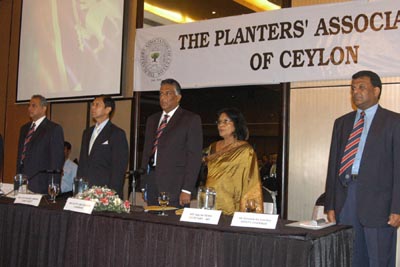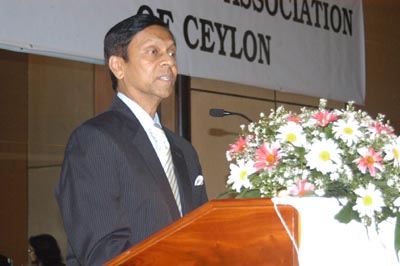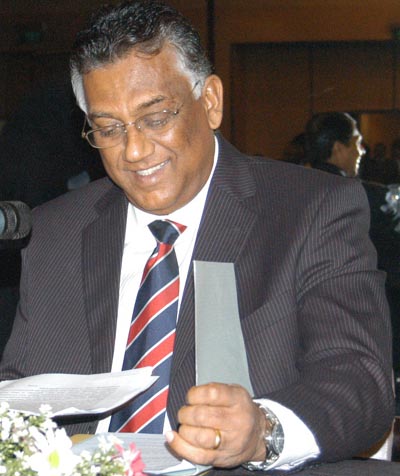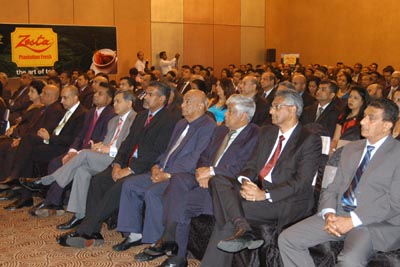Planters' Association celebrates 157 years
 The Planters' Association of Ceylon (PA) held its 157th Annual General Meeting on August 12, 2011 in Colombo. Speaking at the event, the chief guest, Governor of the Central Bank of Sri Lanka, Mr Ajit Nivard Cabraal, noted that Sri Lanka produced the best tea, best rubber and the best cinnamon in the world and congratulated the industry on its achievements during the last year. Mr Cabraal noted the record 329 million kilos of tea produced in 2010 that saw annual export earnings from tea hit US$ 1.3 billion. He also noted the 68% value addition of Sri Lanka’s tea exports and expressed the hope that the balance 32% will also soon leave the country in value added form. The Planters' Association of Ceylon (PA) held its 157th Annual General Meeting on August 12, 2011 in Colombo. Speaking at the event, the chief guest, Governor of the Central Bank of Sri Lanka, Mr Ajit Nivard Cabraal, noted that Sri Lanka produced the best tea, best rubber and the best cinnamon in the world and congratulated the industry on its achievements during the last year. Mr Cabraal noted the record 329 million kilos of tea produced in 2010 that saw annual export earnings from tea hit US$ 1.3 billion. He also noted the 68% value addition of Sri Lanka’s tea exports and expressed the hope that the balance 32% will also soon leave the country in value added form.
Addressing plantation industry concerns regarding the cost of replanting in the face of rising operating expenditure, Mr Cabraal said plans are under consideration to establish a special credit scheme to facilitate long term assistance to the plantation sector, through banks. This credit line is expected to help plantation companies finance re- planting and new planting.
 Speaking at the event, the Chairman of the PA, Lalith Obeyesekere, thanked the Minister of Plantation Industries, the Hon Mahinda Samarasinghe, for being a source of encouragement to the industry and applauded the appointment of respected corporate leaders as heads of regulatory and advisory bodies in the plantation sector, that have resulted in effective public - private partnerships. Mr Obeyesekere made special mention of the Minister’s decision to revive the Golden Shareholder meetings, after a lapse of over two years, that has helped improve communications between the industry and policymakers. The head of the PA said the government decision to include the corporate sector in its fertilizer subsidy scheme, that was previously limited to small holders, has been a strength to the industry. Speaking at the event, the Chairman of the PA, Lalith Obeyesekere, thanked the Minister of Plantation Industries, the Hon Mahinda Samarasinghe, for being a source of encouragement to the industry and applauded the appointment of respected corporate leaders as heads of regulatory and advisory bodies in the plantation sector, that have resulted in effective public - private partnerships. Mr Obeyesekere made special mention of the Minister’s decision to revive the Golden Shareholder meetings, after a lapse of over two years, that has helped improve communications between the industry and policymakers. The head of the PA said the government decision to include the corporate sector in its fertilizer subsidy scheme, that was previously limited to small holders, has been a strength to the industry.
 Discussing the future of the sector Mr Obeyesekere drew attention to a recent study of the plantation industry by an independent consultant, Dr. Ms. Ramani Gunathilaka, that states an increase in productivity is fundamental to increase profitability of Sri Lanka’s plantation sector and that losses experienced, specially by high, mid and Uva producers of tea, are largely due to the plantation industry’s inability to increase productivity sufficiently to offset high costs compared to competitor producers. Mr Obeyesekere said the report has now been presented to policy makers and trade unions. A diagnostic survey undertaken by the Tea Research Institute (TRI) on replanting, has also concluded that replanting of tea is not economically viable under current prices and cost of production. Discussing the future of the sector Mr Obeyesekere drew attention to a recent study of the plantation industry by an independent consultant, Dr. Ms. Ramani Gunathilaka, that states an increase in productivity is fundamental to increase profitability of Sri Lanka’s plantation sector and that losses experienced, specially by high, mid and Uva producers of tea, are largely due to the plantation industry’s inability to increase productivity sufficiently to offset high costs compared to competitor producers. Mr Obeyesekere said the report has now been presented to policy makers and trade unions. A diagnostic survey undertaken by the Tea Research Institute (TRI) on replanting, has also concluded that replanting of tea is not economically viable under current prices and cost of production.
This year in May, Sri Lanka’s plantation industry signed another Collective Agreement that increased wages to Rs 515 per day, per plantation employee. This, said Mr Obeyesekere, translates into a 27.1% increase of the monthly wage bills in plantation companies, in the case of 75% work attendance. Mr Obeyesekere said the industry needs to improve productivity to absorb this latest increase in the cost of production.
While noting the excellent performance by the tea sector in 2010, Mr Obeyesekere said Sri Lanka’s tea industry is facing a new threat from the prevailing instability in the middle-east. The middle-eastern bloc is Sri Lanka’s largest tea buyer, accounting for approximately 60%-70% of total Sri Lankan tea exports. However, the current instability in the Middle East has caused prices of Ceylon Tea to reduce sharply hurting incomes of tea producers. Mr Obeyesekere expressed concerns that until the Middle East stabilizes, Sri Lanka’s tea industry prospects would remain cloudy in 2011.
 Reviewing the rubber sector, Mr Obeyesekere said rubber recorded impressive results, with production peaking at 153 million kilos in 2010 and the average price reaching Rs.450, per kilo with the special grades, RSS1 and Crepe No.1 averaging at Rs.500 and Rs.550 per kilo at the Colombo auctions. Reviewing the rubber sector, Mr Obeyesekere said rubber recorded impressive results, with production peaking at 153 million kilos in 2010 and the average price reaching Rs.450, per kilo with the special grades, RSS1 and Crepe No.1 averaging at Rs.500 and Rs.550 per kilo at the Colombo auctions.
Coconut production however, continued to decline due mainly to fragmentation and disposal of coconut lands for housing and other development activities, and lower fertilizer application.
Mr Obeyesekere said it was unfortunate that large tracts of uncultivated lands are not readily available to encourage more plantation companies to invest in oil palm cultivation that has seen significant growth in Sri Lanka.
The spice sector also did well in 2010 with Rs.20.25 billion worth of exports of pepper, cloves, coffee, cashew, nutmeg and mace, although cinnamon exports declined marginally. However, Sri Lanka continues to maintain its position as the world’s largest producer of high quality cinnamon.
 Discussing the emerging threat of climate change, Mr Obeyesekere said the plantation industry is supporting the TRI to conduct research with the Natural Resource Management Centre, to analyse the impact of climate change over the past few decades in Sri Lanka’s tea growing areas and to make projections for the years ahead. Discussing the emerging threat of climate change, Mr Obeyesekere said the plantation industry is supporting the TRI to conduct research with the Natural Resource Management Centre, to analyse the impact of climate change over the past few decades in Sri Lanka’s tea growing areas and to make projections for the years ahead.
Mr Obeyesekere thanked the Minister of Plantation Industries, the Hon Mahinda Samarasinghe, the Secretary of the Ministry of Plantation Industries Mrs. Malini Peiris and other Ministry officials, the Chairman of the Sri Lanka Tea Board, Mr. Susantha Ratnayake and other stakeholders and the TEA, SLTFOA, CBA, the TRI and RRI for their support of the industry throughout the years and expressed confidence of developing stronger partnerships in the future.
|